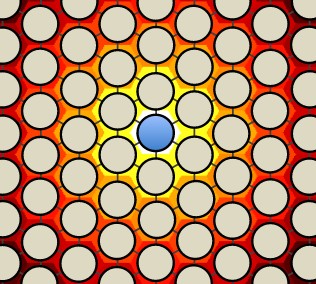Modelling microbial public good
Interview with
Can mathematics model the evolution of altruistic microbes that make molecules benefiting other bugs? Some microorganisms  secrete factors that benefit, not just themselves, but their neighbours too. And mathematician, Benjamin Allen has been developing a way to model how this comes about...
secrete factors that benefit, not just themselves, but their neighbours too. And mathematician, Benjamin Allen has been developing a way to model how this comes about...
Benjamin - So, we've been looking at cooperation in microbes, and this happens a lot in nature. One of the main ways that microbes cooperate is by releasing chemicals that are useful to others. In a colony of cells, one cell or more has to produce some useful chemical and then that benefit is shared by other cells. So, one example of this is yeast cells, when they are out of their preferred nutrient, glucose. They can produce an enzyme that breaks down more complex sugars into glucose. These digested sugars then, they don't go the cell that makes the enzyme, but they're shared kind of throughout the colony.
Chris - So in other words, that one cell that makes, I think it's called invitase isn't it, the enzyme. That goes into the media that all the cells are growing in. So, it's sort of, one cell pays to make that molecular machine, all of the cells benefit from the fact that it's chopping up other sugars to make things available for everybody.
Benjamin - Yes, that's exactly right.
Chris - So, what's the big unknown then?
Benjamin - Well, so this is a form of costly cooperation and the question is how does this behaviour evolve? So, if we think of survival of the fittest, you would think that the cell that produces this enzyme is at a disadvantage because it is doing all the work to produce this and then other cells get to reap the benefit.
Chris - Doesn't that sort of assume that the other cells are going to cheat on the equation in the sense that if the cell is producing some invitase secreted into the local environment, won't its neighbours do the same?
Benjamin - You have to think that behaviour evolved somehow, so at some point there must have been competition between cells that produce this enzyme and cells that don't. And somehow, this production behaviour survived through evolution. So the question is what gives this production behaviour an evolutionary advantage over the cheating behaviour? There's two answers to that. One is that the cell actually does get to keep some of the benefits from its own production of whatever useful resource it makes. The other thing is that if the cells are arranged in some spatial configuration and they reproduce locally, so that they're daughter cells remain near the parent, then they're sharing this benefit with other cells who are also likely to be producers of this public bit.
Chris - Simple to say, I suspect rather tricky to model mathematically.
Benjamin - Right, it is. Our test was to simplify nature enough to be able to do exact mathematics on it, but not so much that we'll lose the essential features of what's going on. For example, in colonies of microbes, cells can be arranged in all kinds of chaotic, interesting ways, but there's a certain regularity to it. E. coli for example, are long, thin cells. So, when they're arranged in a colony, there's some chaos, but there's also spaces where the cells are kind of arranged in a predictable end to end fashion. And so, we took that regularity and said, well let's assume that all the cells are arranged in some very predictable, regular fashion. And so then we can say, well, what if one of these cells produces this chemical, how does that become shared with the various neighbours?
Chris - And what do you find if you do that?
Benjamin - We find that the cooperation behaviour has an evolutionary advantage if the benefits are high enough and if they're shared locally enough. We call this a diffusible of public good, because some of it is kept by their producer, some of it is kept by the neighbours, some of it is kept by the neighbours of neighbours, and that rate of sharing has to be small enough so that most of it really goes to the cell and its immediate neighbours.
Chris - What about the concept of things cheating because it could be that an external organism comes in and steals, it takes away but doesn't pay back into the pot? And equally, it could be that the organism itself evolves to do that and becomes parasitic on its parents, if you'd like, rather like modern day teenagers.
Benjamin - Right. So, that's then the evolutionary question. If you have a colony that's already cooperating, and then a cheater arises in that colony, you have to ask, well, what are the odds that that cheating behaviour will spread throughout the colony? What we find here in our model is that even though this cheating behaviour might initially have an advantage, it doesn't have enough of an advantage to take over because say, the cheater does well initially and produces some offspring, some daughter cells then - those daughter cells - will also be cheaters. And so, the cheater will then be surrounded by other cheaters and thus, in the long term, it won't be actually getting any of the useful public goods that it needs.










Comments
Add a comment